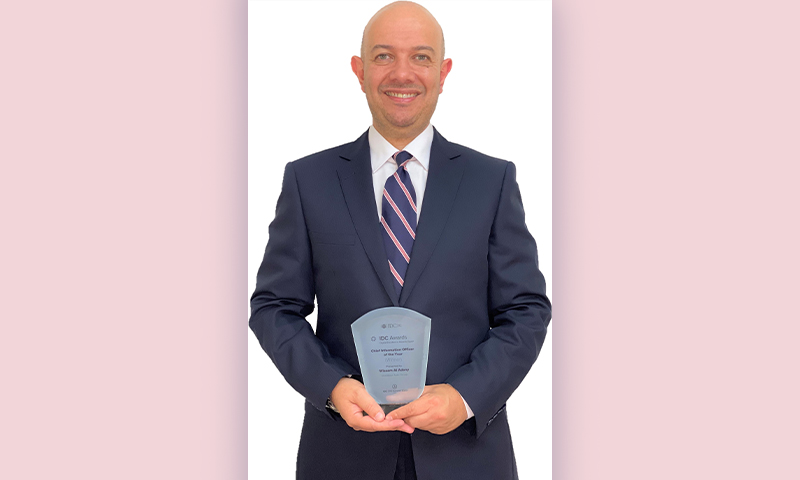Eng. Wissam Al Adany is the Group Chief Information Officer of ADES Arabia Holding, one of the PIF investments. He has 27 years of rich and extensive experience in digital transformation within multinational organizations, including over 4 years of international tenure in Brazil & Kazakhstan. Eng. Al Adany has a solid background in building IT strategies and transforming IT into a business enabler.
Prior to ADES Arabia Holding, Eng. Al Adany was the Regional Chief Information Officer of the United Nations for MENA, Eastern Europe and Central Asia CIO of GB Auto, and a Country IT Director for Lafarge.
In 2022, he received the world’s CIO200 award as a legend CIO in Africa and selected as the best CIO of Automotive in MENA by the Global CIO Forum. Also, he had the “CIO of the Year” award from IDC in 2021 & 2020.
In an exclusive interview with Digital First Magazine, Mr. Wissam Al Adany reveals the 4 key pillars behind successful implementation of digital transformation, what makes ADES Arabia Holding unique, his professional journey, success mantra, and a lot more. Following are the excerpts from his interview.
What are the 4 key pillars to ensure success in implementing digital transformation in an organization? What is the most difficult part of the digital transformation journey?
For the last couple of years, digital transformation has been the main topic in all technology or industrial forums and events. However, no one made a clear definition of digital transformation meaning and what its recipe of success. I led the IT in different industries and organizations, including the United Nations, Lafarge, GB Auto and finally in ADES Arabia holdings. Despite the clear differences between each organization either from its objectives or its business processes, digital transformation had the same meaning to me, it is all about using technology tools/innovations to transform the business from the traditional model to a new digital model by introducing new digital revenue streams, cost reductions or a better customer experience.
The second important point is that digital transformation is not an IT project. It is a business transformation using digital solutions and tools, which means every business unit should be part of it, and it includes a massive culture change.
The third and most important fact about digital transformation is that it is a journey, not a project. It means it is a direction that the corporate decides to take and must finish to gain the benefits.
After understanding the digital transformation concept, there are four main pillars that ensure having a successful transformation. The first pillar is having a clear Digital Strategy that matches the business strategy and corporate objectives. For example, if the business strategy is about doubling the growth rate in 2 years, the digital strategy should be providing digital solutions that provide new digital revenue streams or providing a better customer experience to increase returning customers.
The second pillar is managing the culture change properly. This pillar needs a complete engagement from all management starting from the corporate CEO at the top and moving down to cover all management and middle management team. They need to clearly understand the objective of the transformation and they must embrace it and take ownership of all transformations taking place in their business units.
The third pillar is having a clear transformation plan. This plan should be designed in a way that matches the corporate’s ability to digest the change, its investment capability, and shows the way to measure each project success and its post implementation KPIs.
Finally, the most important pillar is having the right team who can implement the plan. This team could be internal or subcontracted based on the corporate model, but it is very important to hire the right caliber not only from the technical perspective, but from the discipline and attitude perspectives as well. Team is everything, having the proper team can help mitigating plenty of risks and be ready to handle any sudden plan changes.
Having all these pillars ready can save you plenty of challenges and minimizes risks, but still, we must admit that digital transformation is one of the most challenging journeys in an organization’s life. Some of the challenges that frequently faced is culture change. Despite how mature the organization is or how successful in its field, if culture change is not managed properly, this could be very harmful to the transformation success.

In the World CIO Summit, you shed light on the topic ‘Digital Transformation impact on Business Growth & Customers Satisfaction’. Can you brief us about it?
In the old days, the highest IT maturity level in any organization was to be a business enabler. Reaching this level means that this corporate has an Information Technology team who is ready to support the business growth, and future business plans. In modern corporates, technology has become a core business function. It means corporate can use technology solutions to generate new revenue streams or even build a new business line that never exists in the corporate. It depends on the Digital strategy objectives and to which level it matched the business strategy.
For example, while being a Regional CIO for the UN, World Food Program, we have provided different solutions to enhance our customers experience, people who needs food and support, like providing them with a digital card secured by blockchain to provide them with the money support then need remotely and securely. While in GB Auto, we have provided a new consumer finance business line by developing a BNPL system.
Please tell us about yourself and your background. How did you get into the digital transformation space?
When I look back, I feel surprised being an engineer today. This was not part of my future plans. Since I was a kid, I always dreamed of being a famous neurosurgeon. But at the last minute while selecting my major, I decided to go for the engineering field. I still do not know why I did it, and how, but today I feel that it was one of the best decisions I made in my life.
Then, I graduated from the faculty of engineering as a communications and electronics engineer. After 4 years of working in the IT field, I decided to move forward in my academic career to enrich the areas of weakness I had as an engineer. So, I had my MBA, major Finance from the American university. Currently, I am working on my Doctor of Business Administration, which I believe is an essential step in my managerial career.
Regarding my professional career, I had a clear plan and objectives in front of my eyes. I worked all the time to achieve it, and I did. I worked for all corporates I dreamed of being part of it, like GlaxoSmithkline, Lafarge, United Nations. I believe it is all about dedication, hard work and loving what you do.
What sets ADES Arabia Holding apart from other market competitors?
There are many aspects for any organization to be successful in its field. It starts by having a clear management vision about where this corporate is heading and how it will reach there. Also, the passion about achieving this vision, which you can feel when you meet with the management. In addition, having a qualified management team who is capable of implementing this model. In ADES Arabia Holding all these aspects were there. This was the main differentiator between ADES Holding Arabia and its competitors. This what made ADES moved from an Egyptian drilling company to the world’s largest offshore drilling company and getting the trust of ARAMCO to be its main drilling partner.
What parameters should the new CIOs’ keep in mind while defining the right strategy and time to implement new technologies?
A CIO should be thinking as a businessperson, which means he/she should always be business driven not technology driven. Their main objectives is how to use technology to solve business problems, support the employees doing their job in a better way and enhance customers satisfaction. He/She should be the main person in the organization who can speak two languages: business & technology. Accordingly, he is the main person responsible of transforming the business strategy into a successful digital strategy.

You have been a recipient of numerous awards and accolades over the years. Out of them, which achievement is special to you and why?
Each award I received was very special to me. The award is about recognition and appreciation, which are the most amazing rewards you can get after completing your work. However, the one closest to my heart is the first time selected as the CIO of the Year by IDC, for many reasons. First, many of the top talented CIOs were competing for it, and it was an honor being selected as the best among them. On the other hand, it was announced the same day of my birthday, so it was an amazing birthday gift.
A business transformation expert, two times recipient of ‘CIO of the Year’ award, ranked amongst ‘Top CIOs in the MENA’ region, and a keynote speaker: a successful career journey of almost 3 decades. Can you please share the secret sauce of your success with our readers?
People are different and each one has his own recipe of success that fits his capabilities; however, I believe that any person who would like to be successful he/she has to have two important things: A dream to achieve and the passion to achieve it.
Being a dad, what is the one quality you would like your children to inculcate from you and why?
Faith, I always tell my daughters to have faith in their capabilities, to have faith in their dreams. We exist in this world to make a difference, and success is about the difference we make in others’ lives. We should not be competing with each other; we should be helping each other to reach a bigger goal, make an impactful change and a better world.
One piece of advice you would like to give to the budding digital transformation consultants.
If I have the privilege to give an advice to my colleagues, I will remind all us that we are lucky to be part of the new era of the technological revolution. It is our golden chance to change the world in all aspects and in all fields.






